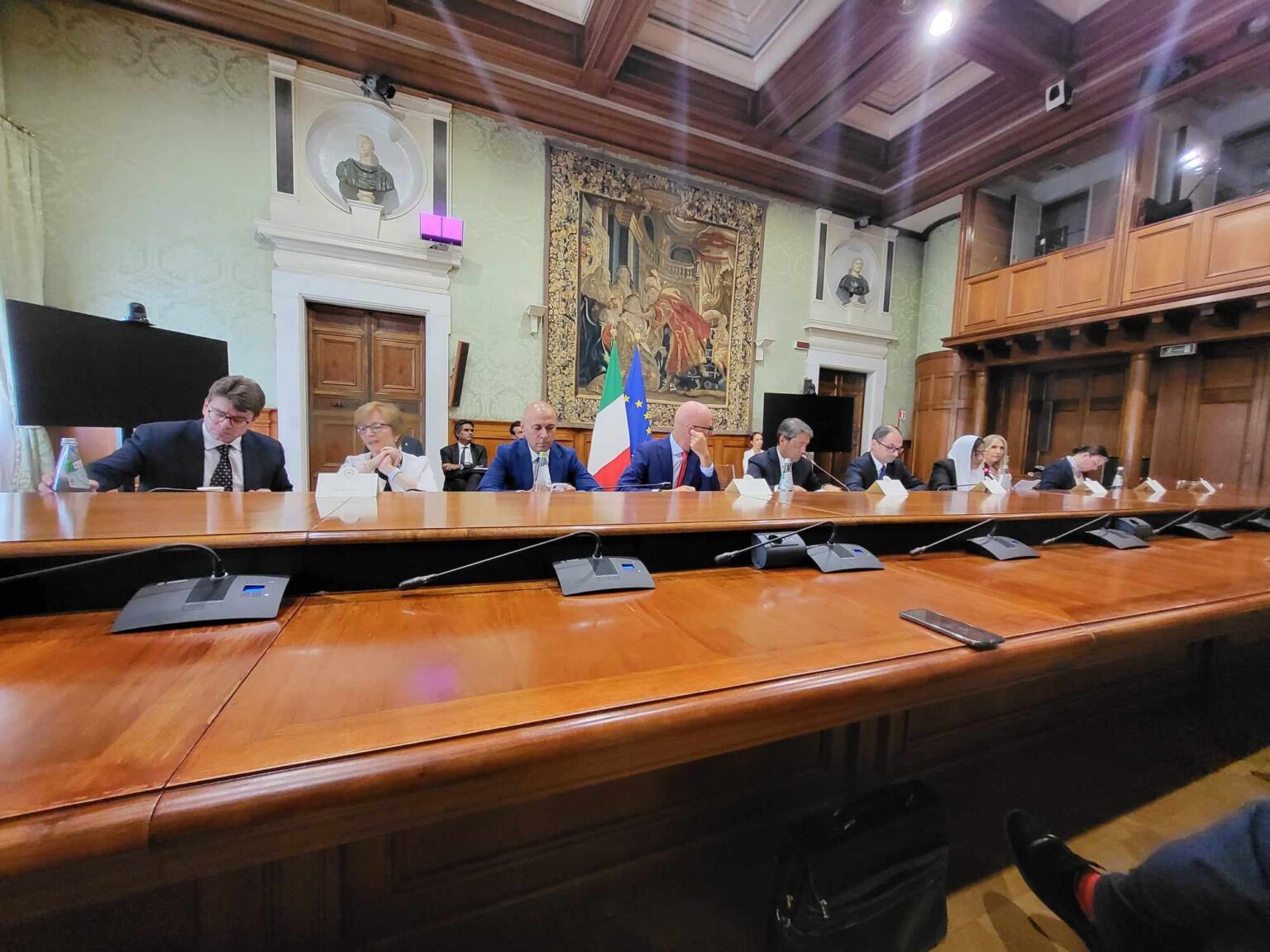Italy’s first Forum on religious freedom, organized with a focus on the Christian minority in Pakistan, witnessed an impactful gathering of distinguished speakers and advocates. The event, held on Thursday July 13th, brought together influential figures, including the Minister of Foreign Affairs and International Cooperation of the Italian Republic, Antonio Tajani, and the ambassador of the Islamic Republic of Pakistan to the Italian Republic, Ali Javed. The meeting was held at the Prime Ministers Office in Rome.
Organised by Professor Shahid Mobeen who lectures on Philosophy and Metaphysics at the Vatican University in conjunction with Davide Dionsi, Special Envoy on Religious Freedom, the event was titled: ‘Development of Religious Minorities is the Development of Pakistan.’
During the Forum, Minister Tajani emphatically stated that “a State cannot claim direct or indirect jurisdiction over the religious beliefs of its citizens.” He emphasized that national institutions must not impose or hinder the public profession and practice of religion by individuals or communities. This fundamental principle lays the groundwork for safeguarding religious freedom as an inherent human right.
Promoted by Davide Dionisi, special envoy for the Italian Minister of Foreign Affairs and International Cooperation, the Forum directed its attention to the plight of the Christian communities in Pakistan. Valeria Martano, representing the Community of Sant’Egidio, brought to light the challenges faced by the Christian minority in the country. Martano highlighted that the roots of marginalization lie not solely in religious differences but in a complex web of social and economic disadvantages.
As per the observations, only 25 percent of the Christian minority in Pakistan has received basic education, leaving the remaining 75 percent uneducated. The lack of educational opportunities denies them access to medium and high-level jobs, perpetuating their social and economic marginalization. To combat this issue, Martano stressed the importance of integration and the implementation of education programs for peace and coexistence, envisioning education as a catalyst for positive social change.
Daniela Canclini, from the Pontifical Urbaniana University, eloquently expressed how the struggles faced by those deprived of religious freedom often intertwine with economic and social disadvantages, particularly affecting women. Canclini emphasized that religious freedom deserves greater recognition and inclusion in international development activities and the 2030 Agenda for sustainable development. She called for increased attention to the rights and wellbeing of those impacted by religious discrimination.
Sara Fumagalli, representing Umanitaria Padana Onlus, shared the organization’s noble mission of liberating young Pakistani women trapped in poverty, illiteracy, child labor, and exploitation. Often subjected to forced marriages and conversions, these women face grave abuses, including rape, torture, and even death. Fumagalli outlined the organization’s efforts to provide educational opportunities for these women, seeking to break the chains of oppression and uplift entire families through social redemption.
VIDEO: Part of Sara Fumagalli’s talk
The heartening success story of one of their beneficiaries, a young Pakistani woman who rose above adversity to earn a PhD in Physics and receive a collaboration proposal from NASA, exemplifies the transformative power of education. Despite facing the challenges of being poor, Christian, and raised without a father in Pakistan, she emerged as a distinguished scientist, challenging stereotypes and inspiring change.
The Forum on religious freedom concluded with a resolute call for international attention and collaborative efforts to protect and promote religious freedom, ensuring equality and social redemption for the vulnerable in Pakistan and beyond.
A representative from the British Asian Christian Association raised a pressing question during the meeting, expressing concern over the failure of Pakistani authorities to uphold laws protecting minority rights. He questioned the commitment of the judiciary, state government, and police in ensuring justice for an unwanted minority.
The representative referred to the Movement of Solidarity and Peace report from 2014, which revealed alarming statistics. According to the report, approximately 700 Christian girls are kidnapped, raped, and forced into Islamic marriages every year—a figure believed to be a conservative estimate (click here).
Additionally, he brought attention to the Bonded Labour System (Abolition) Act of 1992, which has been in effect for decades. Despite its existence, slavery continues to persist and has even increased. Shockingly, it is estimated that there are now around 1 million enslaved Christians working in brick kilns across Pakistan, with further individuals suffering in the carpet weaving industry.
He made a request for Italy to revise its current earmarked aid budget for persecuted Christians, with a specific focus on ensuring that the funds are not only utilized in the main cities but also directed towards the rural areas where Christians face a more degrading and severe form of persecution.
Ambassador of Pakistan Ali Javed, said:
“It is right that the problems of religious minorities should be discussed and this is the reason why we are here today.
“Pakistan is a free country and every Pakistani is free.
“Pakistan is the fourth largest country in the world in terms of population.
“Our parliament has 267 seats and religious minorities also have seats, so the concept that religious minorities do not have freedom in Pakistan is completely wrong.
During his address, Javed vehemently disagreed with our representative’s claims and outright denied the existence of one million enslaved Christians in Pakistan’s brick kilns. However, he did not provide any specific reasons or evidence to support his counterargument.
Similarly, Javed also refuted the assertion that Christian girls were being forced into Islamic marriages and contested the notion that the courts had failed to deliver justice in such cases. However, he did not offer any substantive explanations or data to back up his opposition, he said:
“A man or woman belonging to any religion whether Muslim, Hindu or Christian can fight any injustice.
“The ambassador of Pakistan further said that any person who breaks any kind of law is a criminal of the law.
“According to the law of the state of Pakistan, the criminal should be punished regardless of his religion.
Mr Javed was later questioned by our representative regarding his response, specifically asking why he disagreed with the statistic stating that 1 million Christians are present in Pakistan. In his explanation, he clarified that he did not believe there were 1 million Christians in the country. However, he did not explicitly refute the existence of Christians being enslaved in Pakistan, leaving his address lacking clarity on this particular matter. Moreover, his position remains contrary to the Census of Pakistan which declares that 1.59% of the country is Christians ( approximately 3.7 million of the population).
Professor Shahid Mobeen was awarded a medal of distinction, from the the Italian Consulate in Karachi, for cultural and academic activities for the promotion of interreligious and interculture dialogue..
Mobeen, wrote in a text:
“It was an honour to receive the award from Danilo Giurdanella.
“I hope to put into evidence, philosophically, the common grounds of humanity to pave a path of dialogue and meeting of all human beings, to build a culture and human family of peace.”
Juliet Chowdhry, Trustee for British Asian Christian Association said:
“The situation of religious minorities in Pakistan is a cause for great concern.
“The alarming statistics of abduction, forced marriages, and modern-day slavery underscore the urgent need for action.
“The government of Pakistan must prioritize the protection of its religious minorities and work towards creating an environment where all citizens can exercise their rights and freedoms without fear.
“I’m unimpressed by the statements by Ambassador Javed who largely deflected concerns, using skewed comparisons with nations in the west to declare Pakistan as a free and equal society.
Collaborative efforts from both local and international stakeholders can pave the way for a more just, tolerant, and inclusive Pakistan for all its citizens.
“That starts with more honest openness about failures in governance.
British Asian Christian Association is a charity that provides advocacy and aid to Christians in South Asia. We write articles that inform on political and social matters that affect Christians and other groups globally. We are involved in outreach ministry in South Asia and print Bibles. We also provide disaster recovery assistance to people of all diversities across the globe, where we can. If you would like to donate towards our work please do so (here).


